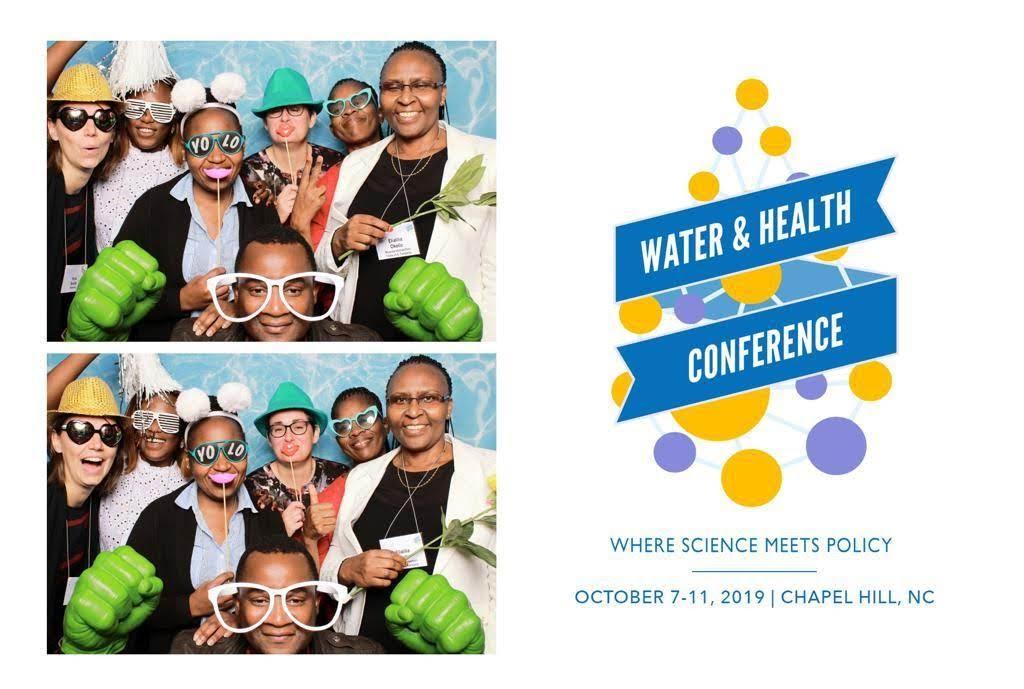Conference reflections from SHARE Research Fellows: Jenala Chipungu

Our SHARE Research Fellows had a busy year in 2019 attending conferences. Two key conferences were UNC Water and Health and the American Society of Tropical Medicine and Hygiene Annual Meeting. In this series of blogs, the Research Fellows share their experiences of the conferences. Jenala Chipungu, SHARE Research Fellow from Zambia, attended both conferences. Here she reflects on the proceedings of the conferences.
Last year (2019) I attended two prestigious conferences, the UNC Water and Health Conference from October 7th - 11th in North Carolina and the American Society for Tropical Medicine and Hygiene (ASTMH) that took place from November 20th – 24th in Washington. Summing up my experiences in a few paragraphs is hard as there’s so much to tell!
At the UNC conference, I had an oral presentation under the theme “Collective Action” titled “An Enhanced Rotational Cleaning System Among Shared Toilet Users.” I was also part of a side-event convened by the Harvard Kennedy School of Government, Water and Sanitation for the Urban Poor (WSUP) and SHARE, titled “An Agenda Setting Workshop for “Limited” (Shared) Sanitation: User Experiences Measurement and Improvement Approaches.” At the ASTMH conference my oral presentation was titled “An Innovative Approach to the Control and Management of Enteric Pathogen Exposures in Bauleni compound, Lusaka, Zambia” and was under the session “Enteric Pathogens in Urban Environments: Understanding Risks and Managing Exposures.”
For my oral presentation at UNC, I shared findings from San-Dem, our randomised control trial (RCT) evaluation of a toilet improvement intervention in Bauleni compound, Lusaka. I spoke about how we improved toilet cleaning activities among shared toilet users in Bauleni by promoting an enhanced rotational cleaning system. There was a lively question and answer session after my presentation and I remember one of the questions I received was about whether we had seen any gender disparities in our findings. This question was eye opening and, because of it, I will be analysing gender differences with respect to toilet improvement in the process evaluation paper I am working on.
The side-event was also very effective in generating research ideas relating to user experiences, measurement and intervention development around the role of shared sanitation in achieving safely managed sanitation for all. The insights from this session are now been written up into a commentary for publication by a collaborative effort between the conveners that I am also a part of. Similarly to UNC, my presentation at the ASTMH conference communicated our RCT evaluation findings from San-Dem. This time I talked about all four toilet improvement outcomes, including the installation of inside and outside locks as well as toilet hole covers. One of the questions from the audience was around how I think such an intervention can be sustained, which was a good question. My answer stressed the need for collaborative efforts with relevant government ministries and the need for funding.
At the UNC conference, there was a rich combination of sessions. It was hard to pick which to attend. Out of the many I attended, I particularly enjoyed the side-event “Using Behavioural Science to Improve Latrine Use in India: What Works and Why?” One of the presentations by Emory University showed how they used a combination of theoretical frameworks including Behaviour Centred Design (BCD) approach to develop the “Sundara Grama” intervention aimed at improving toilet use. It was even more exciting to see the presenter, Dr Bethany Caruso – who I last met in 2015 at a Menstrual Hygiene Management (MHM) meeting in New York. I also had the opportunity of attending sessions on MHM, behaviour measurement, drinking water quality, barrier analysis orientation, willingness to pay approaches, cholera and food hygiene.
The sessions at ASTMH were not exclusive to sanitation and included a spectrum of clinical research studies on diseases like malaria and enteric diseases. One presentation I attended was about formative research exploring the presence of enteric pathogens in the kitchen area of households in India. It was interesting to learn that kitchen tools and utensils appeared to play a major role in the circulation of diarrhoeagenic E. coli within the household. Another presentation I enjoyed was on the geographic variation in oral rehydration therapy coverage and use in low- and middle-income countries between 2000-2017. This well-presented research showed that, while ORS use among children with diarrhoea increased in most locations, coverage for ORS remained below 50% across the geographic units included in the analysis. Also, increases in ORS coverage over time were correlated with declines in ‘recommended home fluids’ (alternative home remedies for ORS treatment, for example home-made ORS or rice water) coverage and declines in diarrhoeal mortality in the majority of study geographical units. During the question and answer session, I advised the researchers to look at the availability of ORS in public and private pharmacies as well as the proper use of ORS among households and see whether there’s any correlation with decline in diarrhoea mortality.
Aside from all the serious learning and networking that was taking place, it was delightful to be with all the SHARE Fellows from Malawi, Kenya and Tanzania as well as colleagues from WaterAid UK, the London School of Hygiene and Tropical Medicine and Harvard Business School. I must say that SHARE has brought us closer, which makes my experience of these conferences a whole lot better.
